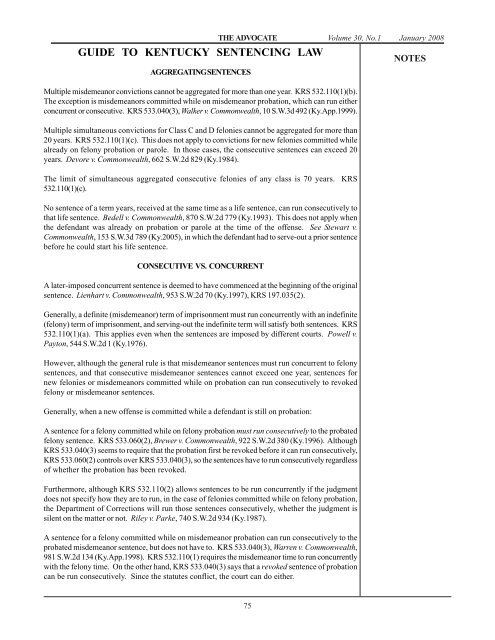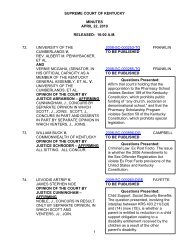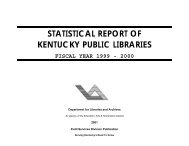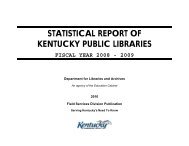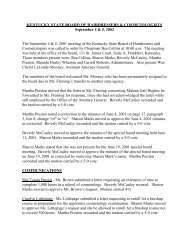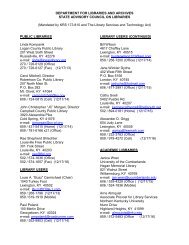Jan08 Advo.pmd - e-archives Home
Jan08 Advo.pmd - e-archives Home
Jan08 Advo.pmd - e-archives Home
Create successful ePaper yourself
Turn your PDF publications into a flip-book with our unique Google optimized e-Paper software.
GUIDE TO KENTUCKY SENTENCING LAW<br />
AGGREGATING SENTENCES<br />
THE ADVOCATE Volume 30, No.1 January 2008<br />
Multiple misdemeanor convictions cannot be aggregated for more than one year. KRS 532.110(1)(b).<br />
The exception is misdemeanors committed while on misdemeanor probation, which can run either<br />
concurrent or consecutive. KRS 533.040(3), Walker v. Commonwealth, 10 S.W.3d 492 (Ky.App.1999).<br />
Multiple simultaneous convictions for Class C and D felonies cannot be aggregated for more than<br />
20 years. KRS 532.110(1)(c). This does not apply to convictions for new felonies committed while<br />
already on felony probation or parole. In those cases, the consecutive sentences can exceed 20<br />
years. Devore v. Commonwealth, 662 S.W.2d 829 (Ky.1984).<br />
The limit of simultaneous aggregated consecutive felonies of any class is 70 years. KRS<br />
532.110(1)(c).<br />
No sentence of a term years, received at the same time as a life sentence, can run consecutively to<br />
that life sentence. Bedell v. Commonwealth, 870 S.W.2d 779 (Ky.1993). This does not apply when<br />
the defendant was already on probation or parole at the time of the offense. See Stewart v.<br />
Commonwealth, 153 S.W.3d 789 (Ky.2005), in which the defendant had to serve-out a prior sentence<br />
before he could start his life sentence.<br />
CONSECUTIVE VS. CONCURRENT<br />
A later-imposed concurrent sentence is deemed to have commenced at the beginning of the original<br />
sentence. Lienhart v. Commonwealth, 953 S.W.2d 70 (Ky.1997), KRS 197.035(2).<br />
Generally, a definite (misdemeanor) term of imprisonment must run concurrently with an indefinite<br />
(felony) term of imprisonment, and serving-out the indefinite term will satisfy both sentences. KRS<br />
532.110(1)(a). This applies even when the sentences are imposed by different courts. Powell v.<br />
Payton, 544 S.W.2d 1 (Ky.1976).<br />
However, although the general rule is that misdemeanor sentences must run concurrent to felony<br />
sentences, and that consecutive misdemeanor sentences cannot exceed one year, sentences for<br />
new felonies or misdemeanors committed while on probation can run consecutively to revoked<br />
felony or misdemeanor sentences.<br />
Generally, when a new offense is committed while a defendant is still on probation:<br />
A sentence for a felony committed while on felony probation must run consecutively to the probated<br />
felony sentence. KRS 533.060(2), Brewer v. Commonwealth, 922 S.W.2d 380 (Ky.1996). Although<br />
KRS 533.040(3) seems to require that the probation first be revoked before it can run consecutively,<br />
KRS 533.060(2) controls over KRS 533.040(3), so the sentences have to run consecutively regardless<br />
of whether the probation has been revoked.<br />
Furthermore, although KRS 532.110(2) allows sentences to be run concurrently if the judgment<br />
does not specify how they are to run, in the case of felonies committed while on felony probation,<br />
the Department of Corrections will run those sentences consecutively, whether the judgment is<br />
silent on the matter or not. Riley v. Parke, 740 S.W.2d 934 (Ky.1987).<br />
A sentence for a felony committed while on misdemeanor probation can run consecutively to the<br />
probated misdemeanor sentence, but does not have to. KRS 533.040(3), Warren v. Commonwealth,<br />
981 S.W.2d 134 (Ky.App.1998). KRS 532.110(1) requires the misdemeanor time to run concurrently<br />
with the felony time. On the other hand, KRS 533.040(3) says that a revoked sentence of probation<br />
can be run consecutively. Since the statutes conflict, the court can do either.<br />
75<br />
NOTES


